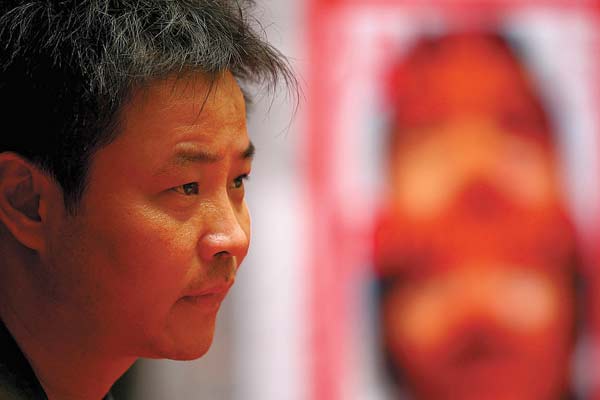Ghost writer
Updated: 2013-08-05 23:24
By Han Bingbin (chinadaily.com.cn)
|
|||||||||||
Yu Hua's latest novel has attracted criticism since its release, but the author defends his work about lost spirits, claiming it deals with the realities of the modern world. Han Bingbin reports.
Author Yu Hua's latest novel The Seventh Day has attracted criticism since its release in June. Many readers have declared it Yu's worst novel, eight years after they claimed one of Yu's most influential works, Brothers, was the worst of its genre. But the author has defended his latest book, calling it his "closest contact with reality". He has also dubbed it "the most representative" of his overall writing style. Yu says the book is a manifestation of all the elements ever featured in his fiction from the 1980s to today.
 |
|
Author Yu Hua is prepared for criticism of his latest novel The Seventh Day and says he will not look at reviews until the comments become rational. [Provided to china daily] |
The Seventh Day, an absurdist work inspired by Genesis, is a tale of many deaths. The narrative revolves around different spirits' experiences and memories in the first seven days after their death, caused by the type of events which have recently aroused controversy in China.
A couple are killed when a house is forcibly demolished. Unsettled spirits from an accidental fire wander around confused. Their deaths have been covered up by the government and their bodies kept away from their families.
Beijing News critic Zhang Dinghao wrote that compared with Brothers, which dealt with a changing society over the course of decades, Yu's latest retelling of recent and widely known social events offers no more insight than reposting a comment on micro blog weibo.
Not to mention the language is outmoded and plain, Zhang adds.
"People can hardly believe it's the result of seven years of work. It's more like Internet fast food, rushed in a couple of days," Zhang writes.
Zhang, like many others, deems Yu's latest work an example of readership positioning the author is trying to appeal to foreigners, given his growing influence overseas after publishing books in more than 20 countries.
Translation will cover and may even improve the rough language that Chinese readers may find uninspiring, Zhang notes, and the social events local readers may find dated will "put on a super-realistic magic coat" overseas.
Technical problems aside, Yu's recollection of social events, in the opinion of critics, are fragmentary and superficial in the first place.
Renmin University's literature professor Yang Qingxiang writes in Beijing News that in a time when everyone is a storyteller on weibo, a good novelist must distinguish himself by writing complex works.
In this instance, Yu has only scratched the surface of the stories and characters, Yang adds.
"The novel lacks a spiritual link. It's not like a novel but rather a simple collection of unrelated short stories. The characters are flat. All of them are like unimportant passers-by, unable to connect with your heart," he writes.
Prepared for criticism, Yu says he will not look at reviews until the talk about the book cools and comments become rational.
Still, in a press release from the publishing team, Yu briefly defended himself, saying he didn't have to copy the daily news cycle because these issues have existed long enough to become part of our lives.
"It's best for me to present these absurd things all at once. I won't focus on one event like I did with Chronicle of A Blood Merchant. In that book, blood selling appears for only four times. I mainly write about their lives, which is what interests me. Blood selling is only a pretext," he says.
He's surprised, however, at how harshly the language of The Seventh Day has been criticized, given the fact that he has refined it numerous times.
"I'm narrating from the perspective of a dead man. The language should be restrained and cold. For the parts in the living world, I add some warmth. The language of a novel is not a random choice. It's decided by the nature of the novel itself," he says.
The powerlessness in the language is an artistic reflection of the sense many people have of feeling weak and helpless, says Fudan University's Chinese literature professor Zhang Xinying.
"He tells the stories through a dead man. I think the desperation expressed in this way is even more profound," he says.
Peking University's Chinese professor Chen Xiaoming says Yu's writing is valuable because he contrasts the desperation caused by social reality, amplifying the value of moral principles and love.
"I feel the cruelness of reality and I write equally cruelly, so I need the warmth. I need the kind part to give myself and the readers hope," Yu says.
Even in The Seventh Day that starts and ends with death, that can seem unrelentingly bleak, Yu has still created warmth.
It's the undisturbed relationship between the protagonist and his adoptive father, the selfless love of a young man who died after selling his only kidney to buy his dead girlfriend a tomb, and more importantly, the sympathy and affection the unsettled spirits show each other when they gather at the "land for the unburied", a place of peace and beauty.
"When I wrote the novel, I had a strong belief that I was writing about the real world as an inverted reflection. My focus is not the real world. It's the world of the dead," Yu says. "When the real world depresses you, I write down a beautiful dead world. This world is neither a Utopia nor a wonderland. But it's beautiful."
In this place, just as Yu writes at the end of the novel, "leaves wave to you, stones smile at you, the river greets you. No poor, no rich, no sorrow, no pain ... everyone dies equal".
Contact the writer at hanbingbin@chinadaily.com.cn.
Related Stories
Yu Hua publishes general anthology 2004-05-18 09:30
Yu Hua 2006-04-13 11:29
YU Hua 2009-11-03 17:02
Today's Top News
Shanghai probes sex claims against officials
Association urges Chinese to have a living will
US extends closure of embassies
New Zealand milk stokes fears
EU solar deal hailed as blueprint
Riding the clean energy boom today
Foreign investors welcome in Beijing
Bespoke shoes, Italian-style, made in China
Hot Topics
Lunar probe , China growth forecasts, Emission rules get tougher, China seen through 'colored lens', International board,
Editor's Picks

|

|

|

|

|

|





